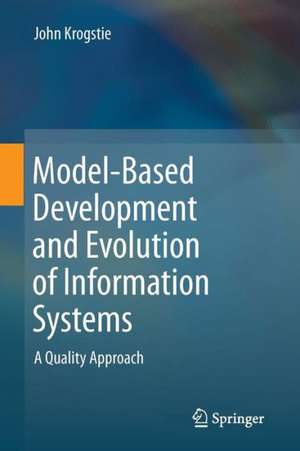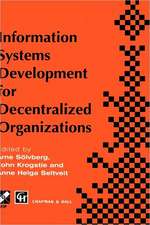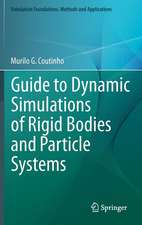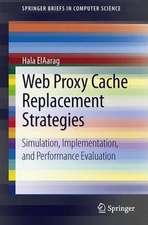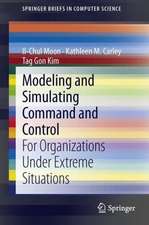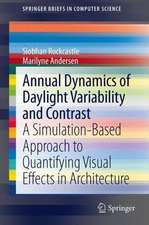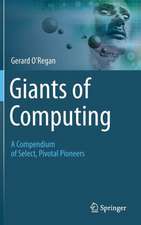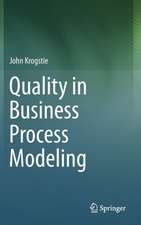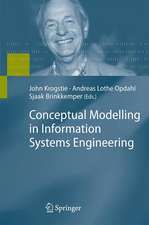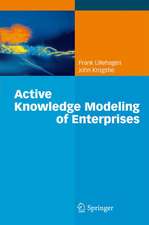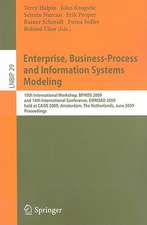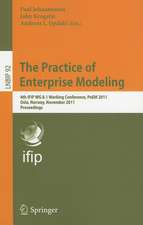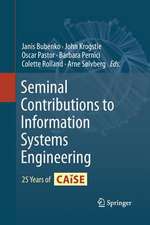Model-Based Development and Evolution of Information Systems: A Quality Approach
Autor John Krogstieen Limba Engleză Paperback – 11 iun 2014
| Toate formatele și edițiile | Preț | Express |
|---|---|---|
| Paperback (1) | 340.49 lei 43-57 zile | |
| SPRINGER LONDON – 11 iun 2014 | 340.49 lei 43-57 zile | |
| Hardback (1) | 345.26 lei 43-57 zile | |
| SPRINGER LONDON – 18 mai 2012 | 345.26 lei 43-57 zile |
Preț: 340.49 lei
Preț vechi: 425.62 lei
-20% Nou
Puncte Express: 511
Preț estimativ în valută:
65.17€ • 70.82$ • 54.78£
65.17€ • 70.82$ • 54.78£
Carte tipărită la comandă
Livrare economică 21 aprilie-05 mai
Preluare comenzi: 021 569.72.76
Specificații
ISBN-13: 9781447161417
ISBN-10: 1447161416
Pagini: 460
Ilustrații: XVIII, 442 p.
Dimensiuni: 155 x 235 x 27 mm
Greutate: 0.64 kg
Ediția:2012
Editura: SPRINGER LONDON
Colecția Springer
Locul publicării:London, United Kingdom
ISBN-10: 1447161416
Pagini: 460
Ilustrații: XVIII, 442 p.
Dimensiuni: 155 x 235 x 27 mm
Greutate: 0.64 kg
Ediția:2012
Editura: SPRINGER LONDON
Colecția Springer
Locul publicării:London, United Kingdom
Public țintă
GraduateCuprins
Introduction.- Methodologies for Computerised Information Systems Support in Organisations.- Modeling Languages: Perspectives and Abstraction Mechanisms.- Quality of Models.- Quality of Modelling Languages.- Specialisations of SEQUAL.- Applications of SEQUAL.- Summary and Outlook.- Terminology.- List of Abbreviations.- Cases.
Recenzii
"I have been working in the field of data since 1975. There is a file rouge that connects several of my contributions. Initially I started working on conceptual models, especially on the Entity Relationship model and conceptual schema design, see the Benjamin & Cummings book, now Pearson, written with Ceri and Navathe. One of my contributions has been to define several desirable qualities of conceptual schemas. More recently, I have addressed the issue of Data quality, in the aspects related to dimensions and methodologies, see the Springer 2006 book with Scannapieco. Later, I have worked on quality of information, addressing several representations such as semi-structured texts, unstructured text, maps and images.
In 2010, when preparing a tutorial for CAiSE in Hammamet, I arrived at the conclusion that a quite important cheer was needed on top of this cake, the issue of quality of models and languages used to produce conceptual schemas and databases, made of values (or data). Think e.g. on the relational model, and to the elegant ways to express the concept of normal form in the model. Language or model, schema, values (or data) are all part of a same universe, and in a sense influence each other with reference to their desired qualities.
For these reasons, the book of John Krogstie, that deals with quality of languages and models, is quite relevant to complete this long and fascinating itinerary about quality of information and data."
Professor Carlo Batini, University of Milano-Bicocca, Italy.
"The quality of a model should be aimed for in each step of the modeling process. This requires a thorough understanding of the quality characteristics of models and of their relevance in each step of the process.This book presents SEQUAL, a complete quality framework that is very useful for defining quality goals and analyzing their achievement in models, modeling processes and modelinglanguages."
Professor Antoni Olivé, Polytechnic University of Catalonia, Spain.
In 2010, when preparing a tutorial for CAiSE in Hammamet, I arrived at the conclusion that a quite important cheer was needed on top of this cake, the issue of quality of models and languages used to produce conceptual schemas and databases, made of values (or data). Think e.g. on the relational model, and to the elegant ways to express the concept of normal form in the model. Language or model, schema, values (or data) are all part of a same universe, and in a sense influence each other with reference to their desired qualities.
For these reasons, the book of John Krogstie, that deals with quality of languages and models, is quite relevant to complete this long and fascinating itinerary about quality of information and data."
Professor Carlo Batini, University of Milano-Bicocca, Italy.
"The quality of a model should be aimed for in each step of the modeling process. This requires a thorough understanding of the quality characteristics of models and of their relevance in each step of the process.This book presents SEQUAL, a complete quality framework that is very useful for defining quality goals and analyzing their achievement in models, modeling processes and modelinglanguages."
Professor Antoni Olivé, Polytechnic University of Catalonia, Spain.
Textul de pe ultima copertă
There is no single approach to modelling and model-based systems development that is best for all possible situations. Therefore, a high-level overview is needed in order to evaluate the options and identify the optimal approach.
This unique textbook/reference introduces and describes in detail the SEQUAL framework for understanding the quality of models and modelling languages, including the numerous specialisations of the generic framework, and the various ways in which this can be used for different applications. Examples are provided from the application of SEQUAL in industrial and governmental settings.
Topics and features:
Dr. John Krogstie is a Professor of Information Systems in the Department of Computer and Information Science at the Norwegian University of Science and Technology, Trondheim, Norway.
This unique textbook/reference introduces and describes in detail the SEQUAL framework for understanding the quality of models and modelling languages, including the numerous specialisations of the generic framework, and the various ways in which this can be used for different applications. Examples are provided from the application of SEQUAL in industrial and governmental settings.
Topics and features:
- Contains case studies, chapter summaries, review questions, problems and exercises throughout the text, in addition to Appendices on terminology and abbreviations
- Presents a thorough introduction to the most important concepts in conceptual modelling, including the underlying philosophical outlook on the quality of models
- Describes the basic tasks and model types in information systems development and evolution, and the main methodologies for mixing different phases of information system development
- Provides an overview of the general mechanisms and perspectives used in conceptual modelling
- Predicts future trends in technological development, and discusses how the role of modelling can be envisaged in this landscape
Dr. John Krogstie is a Professor of Information Systems in the Department of Computer and Information Science at the Norwegian University of Science and Technology, Trondheim, Norway.
Caracteristici
Introduces and describes in detail the SEQUAL framework for understanding the quality of models and modelling languages Contains case studies, chapter summaries, review questions, problems and exercises throughout the text, in addition to Appendices on terminology and abbreviations Provides examples of the application of SEQUAL in industrial and governmental settings
